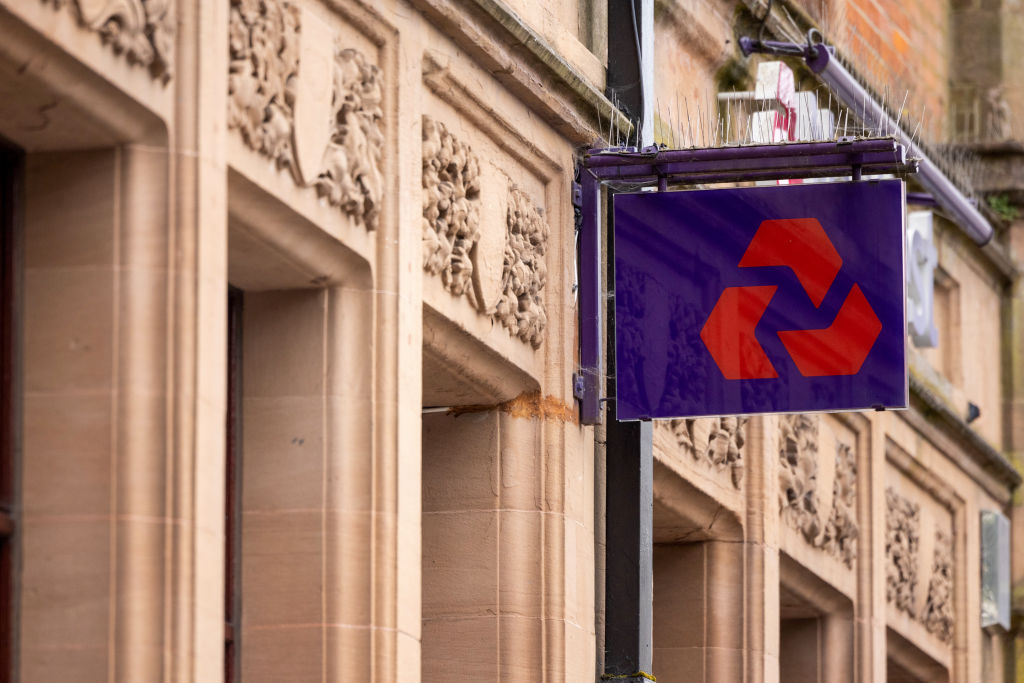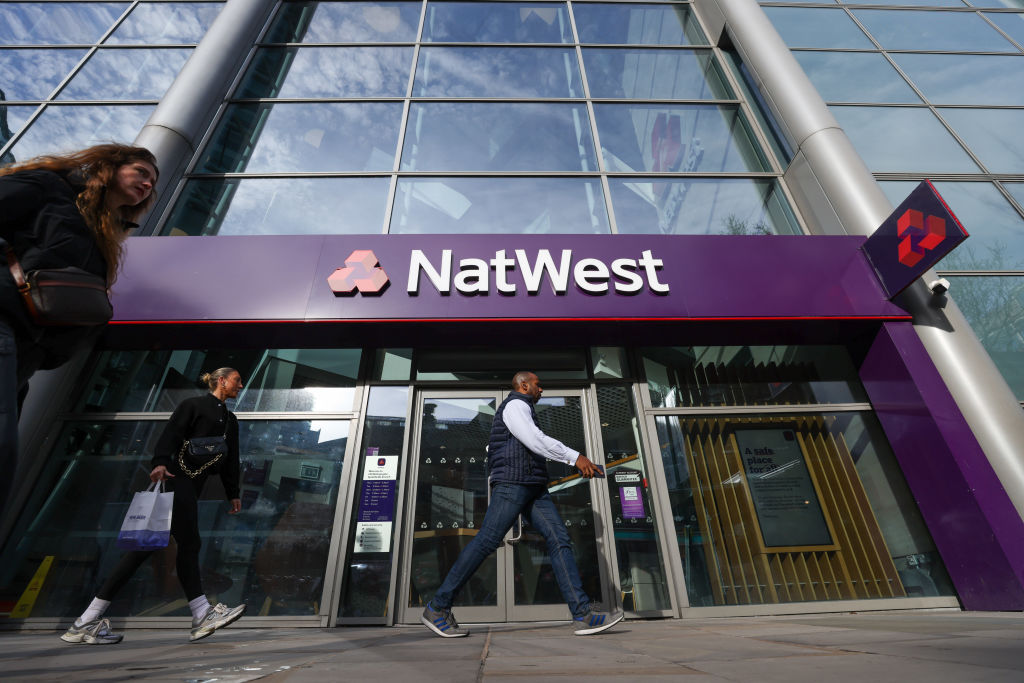NatWest sell-off moves closer as the government offloads more shares
The UK Treasury's stake in NatWest has fallen to below 11% - here is what it means for the share price


Get the latest financial news, insights and expert analysis from our award-winning MoneyWeek team, to help you understand what really matters when it comes to your finances.
You are now subscribed
Your newsletter sign-up was successful
Want to add more newsletters?

Twice daily
MoneyWeek
Get the latest financial news, insights and expert analysis from our award-winning MoneyWeek team, to help you understand what really matters when it comes to your finances.

Four times a week
Look After My Bills
Sign up to our free money-saving newsletter, filled with the latest news and expert advice to help you find the best tips and deals for managing your bills. Start saving today!
The UK government’s stake in NatWest has fallen to below 11% after the Treasury sold off further stock in the bank.
The move comes less than two weeks after NatWest bought back £1 billion of shares from the Treasury earlier this month.
Paul Thwaite, the NatWest chief executive, said at the time: “As a result of NatWest group’s continued strong performance, we are pleased to have today completed our second buy-back of government shares of 2024, further reducing HM Treasury’s shareholding."
MoneyWeek
Subscribe to MoneyWeek today and get your first six magazine issues absolutely FREE

Sign up to Money Morning
Don't miss the latest investment and personal finances news, market analysis, plus money-saving tips with our free twice-daily newsletter
Don't miss the latest investment and personal finances news, market analysis, plus money-saving tips with our free twice-daily newsletter
The transactions mean NatWest continues to edge closer to full privatisation and comes after chancellor Rachel Reeves abandoned plans to sell the government’s remaining stake in NatWest to the public.
What is happening with NatWest’s share price?
The bank’s share price has almost doubled over the past 12 months. At the end of last month, it rose by just shy of 5% on the day it revealed its operating profits were £200 million higher than expected during the third quarter.
The banking group said it made an operating pre-tax profit of £1.7 billion between July and September 2024, nearly a third higher than the £1.3 billion generated during the same period last year. Analysts were forecasting profits of £1.5 billion.
The increase was partly driven by an increase in lending and the amount of money customers deposited with the bank.
The results sent shares in the bank to their highest levels since 2015.
Thwaite said at the time: “The strength of NatWest Group’s performance is underpinned by the support we provide to our 19 million customers in every nation and region of the UK.
“Throughout the third quarter of 2024, we have grown our lending, helping customers to buy or remortgage their homes or to start and grow their businesses. With customer activity increasing… and defaults remaining low, we are well placed to succeed with our customers and for our shareholders in the months and years ahead.”
Why did NatWest ditch its public share sale?
Reeves abandoned plans to sell the government’s remaining stake in NatWest to the public in July, saying it would not “represent value for money”.
The Labour chancellor said that a retail share sale of the bank would now not happen as it would have meant having to offer the public discounts worth hundreds of millions of pounds, which would be damaging for taxpayers.
At one stage, NatWest was 84% owned by the state after a £46 billion bailout at the height of the financial crisis.
A public sale would "not represent value for money, and it will not go ahead", Reeves told MPs as part of a statement on public finances. She added: “It’s a bad use of taxpayer money and we will not do it."
Sarah Coles, head of personal finance at Hargreaves Lansdown, said at the time: “The news that retail investors will be frozen out as NatWest shares are sold off is bitterly disappointing. Retail investors are all too often overlooked and yet they are important backers of UK companies, holding a greater proportion of their assets in the UK compared to the likes of pension funds.”
Get the latest financial news, insights and expert analysis from our award-winning MoneyWeek team, to help you understand what really matters when it comes to your finances.
Chris is a freelance journalist, and was previously an editor and correspondent at the Financial Times as well as the business and money editor at The i Newspaper. He is also the author of the Virgin Money Maker, the personal finance guide published by Virgin Books, and has written for the BBC, The Wall Street Journal, The Independent, South China Morning Post, TimeOut, Barron's and The Guardian. He is a graduate in Economics.
-
 Should you buy an active ETF?
Should you buy an active ETF?ETFs are often mischaracterised as passive products, but they can be a convenient way to add active management to your portfolio
-
 Power up your pension before 5 April – easy ways to save before the tax year end
Power up your pension before 5 April – easy ways to save before the tax year endWith the end of the tax year looming, pension savers currently have a window to review and maximise what’s going into their retirement funds – we look at how
-
 Nationwide promises to protect all its branches from closures until at least 2030
Nationwide promises to protect all its branches from closures until at least 2030The building society has extended its pledge to keep all high street Nationwide and Virgin Money branches open, now until at least 2030.
-
 Thousands of Brits switch to Nationwide, Monzo and NatWest – which banks are least popular?
Thousands of Brits switch to Nationwide, Monzo and NatWest – which banks are least popular?We look at the most and least popular banks and building societies as current account bank switches reach a record high. Is it worth moving your money?
-
 NatWest online banking and mobile app 'running again' after outage
NatWest online banking and mobile app 'running again' after outageBreaking NatWest's online banking and mobile app went down this morning, affecting as many as 10 million users.
-
 Best and worst UK banks revealed
Best and worst UK banks revealedWe reveal the best UK banks – and the worst – when it comes to managing your money and good customer service. How does your provider compare?
-
 iPhone users can now check bank balance from Apple Wallet
iPhone users can now check bank balance from Apple WalletNew tool aims to make it easier for smartphone users to track bank balance and spending
-
 Barclays launches £175 switching deal - plus earn 5.12% interest on cash
Barclays launches £175 switching deal - plus earn 5.12% interest on cashBarclays launches £175 switch bonus, which also gives you access to 5.12% easy access savings. We have all the details
-
 Act now to bag NatWest-owned Ulster Bank's 5.2% easy access savings account
Act now to bag NatWest-owned Ulster Bank's 5.2% easy access savings accountUlster Bank is offering savers the chance to earn 5.2% on their cash savings, but you need to act fast as easy access rates are falling. We have all the details
-
 Credit card providers slash 0% balance transfer deals
Credit card providers slash 0% balance transfer dealsCustomers face a double whammy of record-high APRs and shorter 0% balance transfer periods. We look at what’s going on in the credit card market
